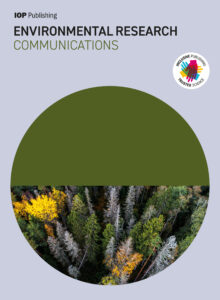ERC特刊征稿|Focus on Climate Leadership

特刊详情
客座编辑
- Tao Ma,哈尔滨工业大学
- Xinlu Sun,北京大学
- Andrew Sudmant,英国爱丁堡大学
- Zhifu Mi,英国伦敦大学学院
主题范围

Image credit: Pixabay
Climate leadership is the ability to drive ambitious and effective action on climate change through vision, influence, and commitment. It involves setting bold targets, implementing practical solutions, and inspiring others to act, while promoting equity and long-term sustainability.
Climate leadership has become a defining feature of the global response to the climate crisis. With the escalating urgency of climate change, there is a growing need for visionary leadership across governments, industries, cities, communities, and individuals. Ambitious climate commitments are insufficient without realistic and implementable action plans. Decisive leadership is thus paramount to unite stakeholders in collective action and guarantee that decisions are informed by rigorous scientific analysis. Effective climate leadership enables the formulation and implementation of ambitious policies, drives innovation, mobilises finance, and ensures inclusive and just transitions towards a sustainable future.
Climate leadership has been demonstrated at multiple levels, including national, regional, city, institutional, and individual, etc. Within the UNFCCC framework, annual multilateral climate negotiations facilitate national pledges towards ambitious climate goals and associated action plans. Numerous cities have proactively established climate alliances, implementing enhanced emissions mitigation strategies within their jurisdictions. Furthermore, corporate entities are issuing climate targets and fostering the transition toward low-carbon supply chains and consumption patterns via the transformation of existing business models. Proactive and accountable climate leaders are demonstrating effective climate action, setting a global precedent and inspiring replication of transformative strategies among other actors.
However, given the currently slow progress of global climate action, more decisive climate leadership is urgently needed to compel effective and tangible climate action from all agents. The pathway to decarbonization is fraught with multifaceted challenges. Although carbon neutrality pledges have become increasingly prevalent among countries and corporations, substantial barriers impede the successful implementation of corresponding mitigation strategies. The efficacy of climate action is being undermined by dual pressures. Firstly, the prevailing trend of global economic deceleration poses a significant obstacle to securing the financial resources necessary to cover emissions reduction costs. Secondly, a complex and dynamic international environment, encompassing trade, energy, and geopolitical considerations, is eroding the perceived urgency of climate concerns. Therefore, strong and decisive climate leadership is more crucial than ever, demanding a concerted effort to re-engage stakeholders and re-establish a shared commitment to mitigating climate change.
This special issue aims to explore how climate leadership is exercised across different scales and sectors, and how diverse actors can work together to accelerate progress toward net-zero emissions, climate resilience, and sustainable development. Contributions from a wide range of disciplines—including economics, policy studies, engineering, management, and environmental sciences—are welcome. We invite submissions that address, but are not limited to, the following sub-themes:
- National and regional climate governance
- Corporate climate strategies and leadership
- Climate finance and investment
- Low-carbon innovation
- Deep decarbonisation of key sectors
- Urban climate action and sustainable infrastructure
- Climate change adaptation and resilience
- International climate cooperation
- Just transitions and social inclusion
- Behavioural change and public engagement
- Climate leadership in emerging and developing economies
This special Issue is launched in conjunction with the International Conference on Climate Leadership, held on 21-22 July 2025, in Harbin, China. We particularly welcome papers presented at the conference and also encourage submissions of original research aligned with the special issue themes. More information about the conference can be found: https://www.ucl.ac.uk/bartlett/events/2025/jul/international-conference-climate-leadership
投稿流程
特刊文章与ERC期刊常规文章遵循相同的审稿流程和内容标准,并采用同样的投稿模式。
有关准备文章及投稿的详细信息,可以参阅IOPscience页面的作者指南。
作者可登入期刊主页进行在线投稿,先选择“文章类型”,然后在“选择特刊”的下拉框中选择“Focus on Climate Leadership”。
投稿截止日期:2025年12月31日。
期刊介绍

- 2023年影响因子:2.5 Citescore: 3.5
- Environmental Research Communications(ERC)是一本开放获取期刊,涵盖与环境研究相关的所有领域,包括跨学科和多学科的研究。ERC发表推动该领域知识的所有研究结果,包括增量研究、负面结果、无效结果、案例分析、区域性研究和复制研究。
